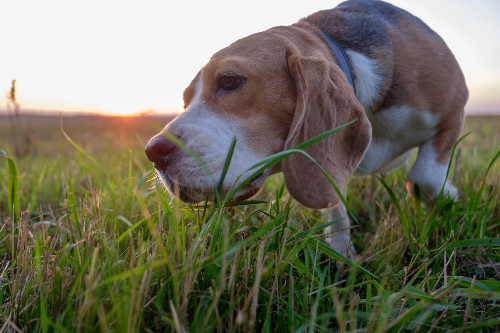Why Do Dogs Eat Grass?

As a pet owner, you might have noticed your furry friend munching on grass during your walks or backyard adventures. This behavior, common among dogs, often raises questions and concerns. At Partners Animal Hospital West Loop, we understand your desire to ensure the well-being of your beloved pet. In this blog, we’ll explore the reasons behind this peculiar habit and when it might be a sign to consult your veterinarian.
Understanding the Grass-Eating Habit in Dogs
The Science Behind Why Dogs Eat Grass
Dogs, despite being predominantly carnivorous, occasionally consume plant matter. Grass-eating can be traced back to their ancestors and is considered a normal behavior for modern dogs. Some theories suggest that dogs may eat grass to fulfill a nutritional need, such as fiber, or to induce vomiting when feeling unwell. However, research shows that only a small percentage of dogs appear ill before eating grass, and even fewer vomit afterwards.
Another perspective is that grass-eating is an inherited trait from wild ancestors who ate prey with plant matter in their stomachs. This behavior might also be a way for dogs to add roughage to their diet, aiding in digestion. It’s also possible that some dogs simply enjoy the taste and texture of grass.
Common Myths and Misconceptions
There are several misconceptions about dogs eating grass, one being that it’s solely due to nutritional deficiencies. While it can be related to a need for more fiber, many well-nourished dogs also engage in this behavior. Another myth is that grass-eating is always associated with illness. As mentioned earlier, most dogs who eat grass do not appear sick beforehand.
When to Be Concerned: Recognizing Unusual Behaviors
It’s essential to differentiate between normal grass-eating behavior and signs that might indicate a health issue. While occasional grass eating is normal, if your dog is eating grass more frequently or showing signs of distress, it’s time to take a closer look.
Identifying Signs of Distress in Your Pet
If your dog is consuming grass excessively or showing symptoms like persistent vomiting, diarrhea, or loss of appetite, these could be red flags. Additionally, if your dog only eats grass and refuses regular food, this behavior warrants attention. Any significant change in your pet’s behavior, eating habits, or physical health should prompt a visit to the veterinarian.
Partnering with Your Vet for Your Dog’s Health
Regular check-ups and open communication with your veterinarian are vital in maintaining your dog’s health. Routine veterinary visits allow for early detection and treatment of potential health issues. At Partners Animal Hospital West Loop, we provide comprehensive health assessments to ensure your pet’s well-being. We understand the unique bond you share with your pet and are committed to providing the best care possible.
If you have concerns about your dog’s grass-eating habits or any other health-related issues, we encourage you to call us at (312) 767-4762 to make an appointment. You can also book an appointment online for a convenient and comprehensive consultation. Remember, while it’s common for dogs to eat grass, any significant changes in this behavior should be discussed with your veterinarian. Trust us to be your partner in ensuring your furry friend’s health and happiness.
About Us
At Partners Veterinary Group, we believe in energizing our team members through shared values, while helping them create value for our clients and patients. Knowing we can help make pets’ and people’s lives better motivates us to continually strive for excellence and love what we do.
Our team consistently works to build educational, supportive, and cooperative work environments that cater to positive experiences and professional growth. We’re constantly evolving, creating innovative ways to deliver cutting-edge medicine to our patients. We equip our teams with tools to enhance their skills and improve their knowledge.
